#TMJ Ear Pain
Text
Me when the issue with my jaw that I’ve been warning my parents about is only gonna get worse ends up getting worse (it’s 9 am and I’m in some of the worst pain of my life)

#I have a fucked TMJ and surprise.#that’s not something good to have fucked!!!!#my entire mouth? agony. my ear? genuine indescribable pain. I will continue to go about my day like it’s nothing tho .#like fuck me for going ‘heyyyy mommyyyy you know the issue I was diagnosed with having in 7th grade?? maybe we should actually…#get that checked out now???’#anyways if I am cranky as hell today that’s why. I’m in so much unbearable pain.
3 notes
·
View notes
Text
Constant pain only dulled for a whole day by daily taking full dosage of tylenol and also 1 advil even tho I'm not supposed to take NSAIDS
Miserable
#extraction is friday. home today then work tues-thurs#and thurs is inventory night :))))#advil is bc in the 4pm-9pm time range the tylenol is not enough#like ive been staggering the doses bc max dosage is 6 pills#and also i want tp try not having to take the advil by overlapping differently but so far not working#earlier pill wears off at 5. took another at 2:30 thats good till 8:30 so in theory i should be ok rn bc i have 2 tylenol in my system#cant take another one until after 4:52 (took the prev dose at 10:52) and its 4:39 and ive been at 6-8 level pain since 4pm#ish.#have a few tricks that lessen the pain and should be helping like cold compress and tugging on my ear and holding my tongue against roof of#my mouth bc it helps for some reason. but all thats doing is stopping it from being a level 10 pain#between tmj pain and whatwvers up w my ear rn (may be related to tmj) and the pain in the gums around the tooth#and the pain from where she did the numbing injections. and both that and the gums are swollen/irritated#the pain bounces back and forth between the different spots and the gums/tooth area throba#throbs* occasionally. so I'm just. in a lot of pain#earlier in the day I'm fine with the one tylenol wearing off soon after i take a 2nd one#and I'm fact i went an hour between one wearing off while a 2nd was in my system before taking the 3rd instead of#what I'll be doing now which is taking another asap after the one wears off. 5pm or asap#last night had to take an advil#and this morning got up late and didnt take a tylenol till 7:30 after last one wore off at 3am#I'll have 1 extra pill tonight i can take either after 11:30pm or after 3am#Or if i can wait it out and take it ehem i get up for work#otherwise my 24 hrs resets at 7:30 tomorrow which means not taking a tylenol when i get up in the morning#reluctantly id take an advil tonight or in the morning i guess
1 note
·
View note
Note
“*frantically googling if sucking too much dick can give you tmj*”
Didn’t you get a sinus infection from sucking dick before or was that someone else
that was me!!!!!!!! i got this nasty sinus infection that took like 2 or 3 rounds of antibiotics and a trip to an ENT to have my ear canal cleaned out bc i let a dude w/ a bare minimum 8 incher skullfuck me by a dumpster at a rest stop
#turns out I've had undiagnosed tmj for like at least 3yrs but possibly more#and all my chronic ear pain is referred pain from the jaw joint#so im banned frm chewing gum & eating hard foods per doctors orders#but I'll be cold and dead in the ground before you tell me i can't suck dick#riv gets asks!#abt
4 notes
·
View notes
Text
is it my wisdom teeth coming in For Real this time or is it something else (my favorite guessing game)
#i think im overly paranoid bc i hate dental procedures#but both my orthodontist and dentist told me im going to need to get them out#and i have tmj so i have jaw pain and stuff that happens#but also it doednt happen often from that?? its mostly just. uncomfortable#and rn my ears are hurtinf so bad and i have pain around both sides of my jaw#but it doesnt hurt in my mouth at the moment so. idk#miles rambles
0 notes
Text
OW OW OW JAW HURT
#literally like a week or so ago my left jaw popped too hard ig and fucking started hurting bad#and since then havent been able to crack it normally instead its just sandpaper sound#which i googled and seems to be called crepitus where the bone goes against each other#and seems like its an issue with my tmj#might be a tmj disorder of some kind bc i have been experiencing variety of symtpoms#like ringing ear and ear and neck pain and jaw pain and the grainy sound obviously#like in the past sometimes my jaw would lovk up or id have to pop it to open my mouth but i didnt think it could be a problem#anyways the pain comes and goes but staticy sound stays and yeah#earlier this week i was tryna enjoy a panini and it lowkey hurt to eat bc the bread was too hard 😔😔#anyways my dads gonna make a doctors appointment for me on monday bc apparently they dont pick up calls on weekends#so ig we shall see#tmj pain#mine#but yeah jaw hurt currently#L joint pain
1 note
·
View note
Text
With both Ashton’s chronic pain and acquired disabilities and Ashley’s casual mention of her ADHD, I’d just like to say how important and meaningful and how grateful I am to see a cast of successful, beloved folks talking about being disabled & anormative. They don’t owe us nothing talking about stuff like this, but sharing it feels like a warm hug and support and ahhh.
For those of you who don’t know, Matt and Liam and Taliesin have both spoken frankly about depression, and Ashley and Travis and Matt have all shared about being/having ADHD, and Matt has also spoken about Body Dysmorphia and growing up with a stutter, among other things. Dani Carr also has mentioned chronic pain, and Liam has hyperacoustis he mentions on occasion (and also one ear that has a different range of hearing) and Taliesin has TMJ and essential tremor:
Ashton’s pain comes from Taliesin’s experience.
Imogen’s overwhelm comes from Laura’s own processing of sound.
Matt could describe painful spells so well because he knows what it’s like.
Liam’s Quest feels so powerful because it explores real experienced hopelessness in the face of depression.
And obviously not everything has been explained—I’d never want to assume a person has PTSD or body issues or anything else based on character, because at the end of the day well researched and realistic depictions are important no matter who they come from and critical role does that better than anything else I’ve ever seen—we know different characters show different elements of their players. And it’s so refreshing and empowering to see disability included as one of those features, without shame or any attempt to be kept hidden.
Thank you, cast of critical role.
Updated with feedback from notes!
687 notes
·
View notes
Text
my jaw and ears are just getting worse and worse
#i think its like tmj but now im having clicking when i chew and pain in the bottom back of my ear plus theyre just like always sore#my ears and jaw
0 notes
Text
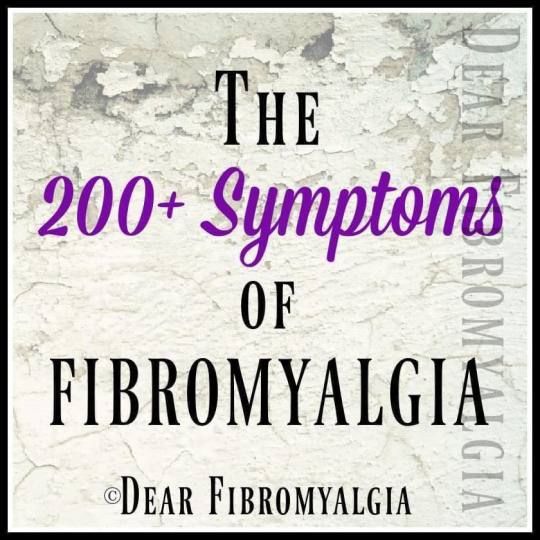
"The 200+ Symptoms of Fibromyalgia"
(Note: Some symptoms may overlap)
GENERAL
1. Activity level decreased to less than 50% of pre-illness activity level
2. Cold hands and feet (extremities)
3. Cough
4. Craving carbohydrates
5. Delayed reaction to physical activity or stressful events
6. Dryness of eyes and/or mouth
7. Edema (Oedema)
8. Family member(s) with Fibromyalgia
9. Fatigue, made worse by physical exertion or stress
10. Feeling cold often
11. Feeling hot often
12. Frequent sighing
13. Heart palpitations
14. Hoarseness
15. Hypoglycemia (blood sugar falls or low)
16. Increased thirst
17. Low blood pressure (below 110/70)
18. Low body temperature (below 97.6)
19. Low-grade fevers
20. Night sweats
21. Noisy joints – with or without pain
22. Poor circulation in hands/feet
23. Profuse sweating
24. Recurrent flu-like illness
25. Shortness of breath with little or no exertion
26. Severe nasal allergies (new or worsening allergies)
27. Sore throat
28. Subjective swelling of extremities – (feels swollen Bu can’t find anything)
29. Sweats
30. Symptoms worsened by air travel
31. Symptoms worsened by stress
32. Symptoms worsened by temperature changes
33. Tender or swollen lymph nodes, especially in neck and underarms
34. Tremor or trembling
35. Unexplained weight gain or loss
PAIN
36. Abdominal wall pain
37. Bad hip pain
38. Burning Nerve Pain
39. Chest pain
40. Collarbone pain
41. Diffuse swelling
42. Elbow pain
43. Exacerbated Plantar arch or heel pain
44. “Growing” pains that don’t go away once you are done growing
45. Headache – tension or migraine
46. Inflamed Rib Cartilage
47. Joint pain
48. Lumpy, tender breasts
49. Morning stiffness
50. Muscle pain - widespread
51. Muscle spasms
52. Muscle twitching
53. Muscle weakness
54. Pain that ranges from moderate to severe
55. Pain that moves around the body
56. Paralysis or severe weakness of an arm or leg
57. Restless Leg Syndrome
58. Rib Pain
59. Scalp Pain (like hair being pulled out)
60. Sciatica-like pain
61. Tender points or trigger points
62. TMJ syndrome
63. “Voodoo Doll” Poking Sensation in random places
NEUROLOGICAL
64. Blackouts
65. Brain fog
66. Carpal Tunnel
67. Feeling spaced out
68. Hallucinating smells
69. Inability to think clearly
70. Lightheadedness
71. Noise intolerance
72. Numbness or tingling sensations
73. Photophobia (sensitivity to light)
74. Seizures
75. Seizure-like episodes
76. Sensation that you might faint
77. Syncope (fainting)
78. Tinnitus (ringing in one or both ears)
79. Vertigo or dizziness
EQUILIBRIUM/PERCEPTION
80. Bumping into things
81. Clumsy Walking
82. Difficulty balancing
83. Difficulty judging distances (when driving, etc.)
84. Directional disorientation
85. Dropping things frequently
86. Feeling spatially disoriented
87. Frequent tripping or stumbling
88. Not seeing what you’re looking at
89. Poor balance and coordination
90. Staggering gait
SLEEP
91. Alertness/energy best late at night
92. Altered sleep/wake schedule
93. Awakening frequently
94. Difficulty falling asleep
95. Difficulty staying asleep
96. Excessive sleeping
97. Extreme alertness or energy levels late at night
98. Falling asleep at random and sometimes dangerous moments
99. Fatigue
100. Light or broken sleep pattern
101. Muscle spasms/twitches at night
102. Narcolepsy
103. Sleep disturbances
104. Sleep starts or falling sensations
105. Teeth grinding - "Bruxism"
106. Tossing and turning
107. Un-refreshing or non-restorative sleep
108. Vivid or disturbing dreams/nightmares
EYES/VISION
109. Blind spots in vision
110. Eye pain
111. Difficulty switching focus from one thing to another
112. Frequent changes in ability to see well
113. Night driving difficulty
114. Occasional Blurry vision
115. Poor night vision
116. Rapidly worsening vision
117. Vision changes
COGNITIVE
118. Becoming lost in familiar locations when driving
119. Confusion
120. Difficulty expressing ideas in words
121. Difficulty following conversation (especially if background noise present)
122. Difficulty following directions while driving
123. Difficulty following oral instructions
124. Difficulty following written instructions
125. Difficulty making decisions
126. Difficulty moving your mouth to speak
127. Difficulty paying attention
128. Difficulty putting ideas together to form a complete picture
129. Difficulty putting tasks or things in proper sequence
130. Difficulty recognizing faces
131. Difficulty speaking known words
132. Difficulty remembering names of objects
133. Difficulty remembering names of people
134. Difficulty understanding what you read
135. Difficulty with long-term memory
136. Difficulty with simple calculations
137. Difficulty with short-term memory
138. Easily distracted during a task
139. Dyslexia-type symptoms occasionally
140. Feeling too disoriented to drive
141. Forgetting how to do routine things
142. Impaired ability to concentrate
143. Inability to recognize familiar surroundings
144. Losing track in the middle of a task (remembering what to do next)
145. Losing your train of thought in the middle of a sentence
146. Loss of ability to distinguish some colors
147. Poor judgment
148. Short term memory impairment
149. Slowed speech
150. Staring into space trying to think
151. Stuttering; stammering
152. Switching left and right
153. Transposition (reversal) of numbers, words and/or letters when you speak
154. Transposition (reversal) of numbers, words and/or letters when you write
155. Trouble concentrating
156. Using the wrong word
157. Word-finding difficulty
EMOTIONAL
158. Abrupt and/or unpredictable mood swings
159. Anger outbursts
160. Anxiety or fear when there is no obvious cause
161. Attacks of uncontrollable rage
162. Decreased appetite
163. Depressed mood
164. Feeling helpless and/or hopeless
165. Fear of someone knocking on the door
166. Fear of telephone ringing
167. Feeling worthless
168. Frequent crying
169. Heightened awareness – of symptoms
170. Inability to enjoy previously enjoyed activities
171. Irrational fears
172. Irritability
173. Overreaction
174. Panic attacks
175. Personality changes –usually a worsening of pervious condition
176. Phobias
177. Suicide attempts
178. Suicidal thoughts
179. Tendency to cry easily
GASTROINTESTINAL
180. Abdominal cramps
181. Bloating
182. Decreased appetite
183. Food cravings
184. Frequent constipation
185. Frequent diarrhea
186. Gerd-like Symptoms
187. Heartburn
188. Increased appetite
189. Intestinal gas
190. Irritable bladder - "Angry Bladder Syndrome"
191. Irritable bowel syndrome - IBS-C, IBS-D
192. Nausea
193. Regurgitation
194. Stomachache
195. Vomiting
196. Weight gain - unexplained
197. Weight loss - unexplained
UROGENITAL
198. Decreased libido (sex drive)
199. Endometriosis
200. Frequent urination
201. Impotence
202. Menstrual problems
203. Painful urination or bladder pain - "Interstitial Cystitis"
204. Pelvic pain
205. Prostate pain
206. Worsening of (or severe) premenstrual syndrome (PMS or PMDD)
SENSITIVITIES
207. Alcohol intolerance
208. Allodynia (hypersensitive to touch)
209. Alteration of taste, smell, and/or hearing
210. Sensitivity to chemicals in cleaning products, perfumes, etc.
211. Sensitivities to foods
212. Sensitivity to light
213. Sensitivity to mold
214. Sensitivity to noise
215. Sensitivity to odors
216. Sensitivity to yeast (getting yeast infections frequently on skin, etc.)
217. Sensory overload
218. Sensitivity to pressure & humidity changes
219. Sensitivity to extreme temperature changes
220. Vulvodynia
SKIN
221. Able to “write” on skin with finger
222. Bruising easily
223. Bumps and lumps
224. Eczema or psoriasis
225. Hot/dry skin
226. Ingrown hairs
227. Itchy/Irritable skin
228. Mottled skin
229. Rashes or sores
230. Scarring easily
231. Sensitivity to the sun
232. Skin suddenly turns bright red
CARDIOVASCULAR (Heart)
233. “Click-murmur” sounds through stethoscope
234. Fluttery heartbeat
235. Heart palpitations
236. Irregular heartbeat
237. Loud pulse in ear
238. Pain that mimics heart attack - "Costochondritis"
239. Rapid heartbeat
HAIR/NAILS
240. Dull, listless hair
241. Heavy and splitting cuticles
242. Irritated nail beds
243. Nails that curve under
244. Pronounced nail ridges
245. Temporary hair loss
OTHER
246. Canker sores
247. Dental problems
248. Disk Degeneration
249. Hemorrhoids
250. Nose bleeds
251. Periodontal (gum) disease
252. Need for early hysterectomy
#fibromyalgia#chronic pain#chronic illness#chronically ill#invisible illness#spoonie#pwd#disability#hidden disability#sharing is caring#disorder#neurological disorder#central nervous system#nervous system disorder#mental health#health#awareness
189 notes
·
View notes
Text
okay actually. i am maybe going to cry lol. here is a non-exhaustive list of the medical professionals i have seen since i was in seventh grade:
too many internists (as primary care/general practice) to actually count. well over a dozen.
two neurologists
one spine specialist
seven physical therapists
two chiropractors
four massage therapists
three dentists
one oral surgeon
i have had many MRIs and x-rays. i have had a lot of blood taken. i have taken rounds of steroids and muscle relaxers for pain/symptom management. there have been times i could not turn my head to one side for months at a time. i have scoliosis, which wasn't figured out until the fifth or so physical therapist, even though previous chiropractors had taken x-rays of my spine.
here is a non-exhaustive list of reasons why i sought such intensive care:
debilitating migraines
severe back pain
severe neck pain
bad pain flares in my back teeth during times of stress
ear aches
here is a non-exhaustive list of things i have been told about myself by these professionals:
the enamel on my teeth was worn off and had to be artificially reapplied "because" i "brushed my teeth too aggressively."
that the reason my ears hurt was "because" i "cleaned them too aggressively" and there was no protective ear wax left.
that the lowest three discs in my spine were degenerating.
that i was grinding my teeth in my sleep.
that i was hyper-tensing in my sleep and that i should "take xanax daily & nightly to make it stop."
that i had scoliosis. (this one is 100% confirmed)
that i needed therapy to become less stressed so my muscles would relax.
that i needed massage therapy and other various treatments to address how tight all my fascia was in certain parts of my body.
that i should try mouth guards because the teeth grinding had started to do real damage.
that i should enter a sleep study for how intense and chronic my insomnia was.
that the pain in my hands/tingling in my fingers was because my wrists were too weak.
that there was "something evil stored" in my neck
and then. an anon yesterday asked if i had tmj. and i said probably not. and then @chronodyne slid me a message that said "re: tmj, mine is myofascial and i also don’t have the clicking/trouble opening my mouth."
so i did some reading.
starting with myofascial tmj got me here (cedars-sinai.org)


i paused to look up bruxism, which turns out to be the medical term for grinding/clenching your fucking teeth:
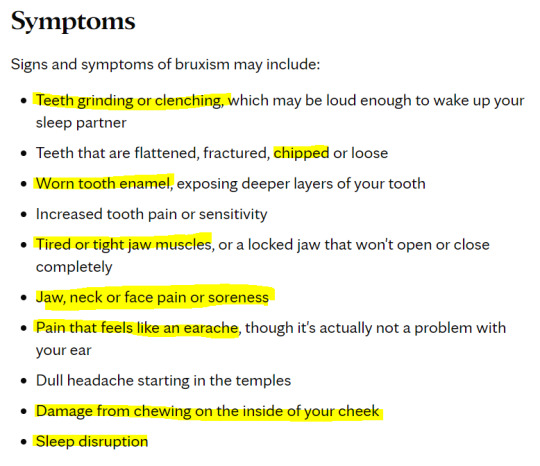
highlights are things i have experienced and sought or had medical attention for (dull headaches are not highlighted because i have only ever sought medical attention for migraines, though i certainly have dull headaches all the time).
okay. so i know i clench my jaw/grind my teeth in the daytime. and a dentist has told me before that it's evident i do it in my sleep, too. just the other day i woke up with a ravaged inside right cheek from chewing it in my sleep. so i can safely self-diagnose bruxism.
back to tmd.


highlights are symptoms i have experienced. i did not highlight teeth sensitivity because i would classify it as pain instead. but you don't understand the howl i let out internally when i read the ringing in the ears and numbness/tingling feeling in your fingers bullet points. i have been operating under the assumption that i have tinnitus and probably a very scary autoimmune disorder that i just am better off ignoring (this is not medical advice, it's avoidance). i'm not saying i don't have those things, but i also never knew there were other possibilities.

over the course of my life i have had many injuries to my neck and actually i have also had a pretty severe concussion before, which i would classify as a head injury. i have many of the symptoms listed for tmd. i have even undergone, incongruously, many of the treatments for it. so many doctors have noted and attempted to address issues with my fascia, with my muscles, with my tension.
it raising its ugly head when i'm stressed makes sense i literally said in my post yesterday DOES THIS HAPPEN TO ANYONE WHEN THEIR BLOOD PRESSURE RAISES LOL SOB
i cannot conclusively diagnose myself with tmd or, for that matter, with mps (myofasical pain syndrome, which i had also never heard of!). but i am so, so frustrated because i have never even heard these words. i have never been screened for these things. no medical professional has ever discussed these possibilities with me, even when they're treating me for several of the symptoms!
i'm crying for all the tests i've undergone that led to nothing. always, infuriatingly, labeled a medical mystery. for the rounds of steroids and muscle relaxers i've been prescribed. for the painful manual manipulations i've been subjected to. for every single person who ever touched my body commenting on how tight/tense my neck is. for the addiction that stemmed from that first xanax prescription when i was 15 that caused so much fucking grief in my life. for the chronic pain that has swallowed whole decades of my life and sapped my energy since i was a child.
none of these symptoms were ever NOT disclosed to a medical professional. at each one, i did the immense labor of dragging out my entire, perplexing medical history, including injuries and past issues and treatments. but nobody ever thought to consider this? nobody, with all those degrees, with those long careers, with all those patients, ever thought to consider this? while i was in all those paper gowns, on all those cold tables, getting poked and prodded, crying, paying for tests i could not afford, so sleep deprived i thought i'd die at 25, nobody considered this?
anyway @chronodyne suggested seeing an oral surgeon to discuss this so. i guess that's what i'm looking up next.
#caitlin if this changes anything i owe you my entire fucking life#my lyfe#medical bullshit cw#the kvetching department
17 notes
·
View notes
Text
My FB post right now is being so useful:
Me: Okay, someone with TMJ, trigeminal nerve pain, and sinus pain help walk me through the differences so I can figure out what's happening in my face.
My microbiologist friend: "OMG SOMEONE FINALLY NEEDS ME!!!!
TMJ is an achy, muscular pain. If you press on the hinge of your jaw and/or the back of your skull where it meets your neck, you will feel intense pain followed by release. Causes headaches on one side, usually in the back. Opening your mouth wide while touching your jaw will produce a “pop” on one side and a feeling of sliding sideways on the other. Helped by: NSAIDS, muscle relaxants, heat. Hurt by: crunchy food, chewy food, jaw clenching.
Trigeminal neuralgia feels like random electrical shocks at the base of your teeth, radiating up into your cheek. One side. No headache. Pain can also be sharp or burning (when mine was at its worst it felt like someone put a flaming fireplace poker between my teeth and slammed my jaw shut), but the hallmark is that “shocky” pain. Helped by: medication that is specifically for nerve pain (like gabapentin). Absolutely nothing else helps. Hurt by: ??? (Mine is kind of related to the cold but…???)
Sinus pain is usually heavy pressure and an ache or occasional sharp pain in the jaw. Headaches bilateral and in the front of the head, in a “mask” around the eyes. Trigger points are at the inside corner of the eyebrow and the outer corner of the nostrils, applying firm pressure there will cause SEVERE pain that will lessen over time. Cheeks and forehead may also be sensitive to touch. Also might present as a sore throat. Helped by: sudafed, antihistamines, NSAIDS, cold. Hurt by: that depends on the person. If it’s unrelenting and doesn’t respond well to meds you should see a doctor to check for infection.
Oh my goodness I feel so useful 🖤"
My reply: "I love you. I also feel like all of that happened at the same time. But I'm going to call it TMJ, because the thoracic pain and upper shoulder stiffness is specific to the palsy spasticity, which means it'll hit the jaw muscles on both sides in slightly different ways."
Other friends also weighed in!
A. said "TMJ feels like you have the bottom jaw and the jaw joint hit with a hammer. Sinus pain in face feels like you could stick something into your eye or up your nose and it would pop the balloon that growing in your skull. Trigeminal nerve is one of the worst pains you have ever experienced and you would be at the hospital. It usually only affects one side of the face and it feels as thought someone is slicing your face open. (I don’t have it but a friend does but I experienced mild symptoms after a surgery that temporarily inflamed that nerve and even minor pain it was horrid and gave me a much much less accurate idea of how much pain my dear friend deals with cause mine was like 20% compared to her 100%)"
-
K. said: "TN can be bilateral and can be triggered or exacerbated by the same range of meds prescribed to relieve it.
Sinus pain may respond to pseudoephedrine, but phenylephrine ain't shit, so check your Sudafed formulation before you decide that decongestant doesn't work.
TMJ, you might notice that you're clenching or grinding at night... or other people might notice more than you do.
Also consider for differential diagnosis, these things that can cause REALLY fucking bizarre referred-pain:
Ear infection (look for fever or pain spiking at weird times when you can't identify a trigger, also maybe nausea)
Dental/oral nerve impingement or infection, try swishing with an analgesic like a chloraseptic spray or lozenge, or oragel. See if pan resolves.
Try tapping on teeth and gums. See if any of them feel 'weird.'
Brush/floss/waterpik/whatever very thoroughly and then gargle and swish as aggressively as you can.
I had a poppy seed making me think I was getting shingles one time. Once it was out, I was fine. Weirdest fucking shit... anyway..."
14 notes
·
View notes
Text
Also it's like wear over ear headphones to prevent tinnitus but I can't BC TMJ pain and I'm just. A paranoid hypochondriac and in near constant jaw pain aghhh
13 notes
·
View notes
Text
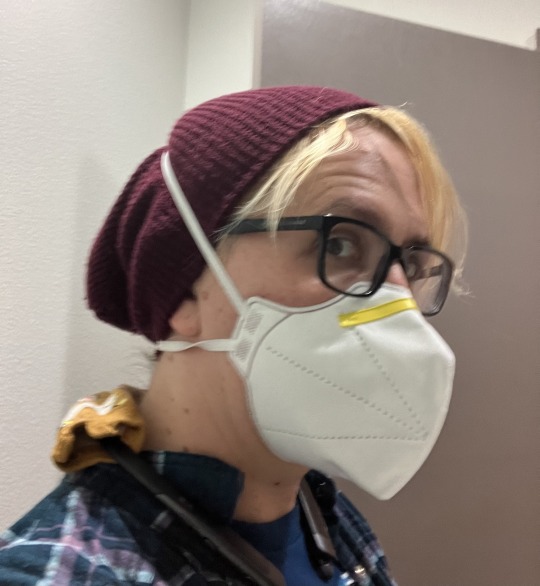
Inspired by the number of jaw issues I’ve been working on: please consider changing your masks from ones that loop over the ears to ones that go around your head, like the one I’m wearing above. Your ears are closely connected to your jaw and having them pulled forward constantly also screws up your jaw.
https://www.cbc.ca/news/canada/edmonton/covid-mask-mouth-chronic-pain-tips-1.5999982
43 notes
·
View notes
Note
just curious cus i heard t increases muscle mass and fat redistribution. I know it doesn't change bone structure but still...
how do you deal with your tmj cus mine is killing me! :L mine is not painful per say but it does feel like I have a knot in my jaw and my ears are clogged all the time (especially in the morning)
So true, tmj pain comes from the muscles so T has gotta be doing something in there 😆
If you're anything like me, this is gonna be sad news, but. You have to wear a night guard. Every night. I know they suck, they're uncomfortable and kinda gross in the morning. But the longer you go without consistently wearing one, the worse the TMJ is gonna get, and some of those changes are gonna be irreversible.
Even if you don't realize it, you 100% are grinding/clenching your teeth at night. That's what's making your ears feel clogged, and it's going to get exponentially worse if you don't get on top of it. I'm talking intense jaw/ear pain, and even the risk of breaking your teeth.
Get some of these moldable mouth guards. Most drugstores will have them and they're generally pretty inexpensive, especially compared to the cost of the dental work you're protecting yourself from needing:

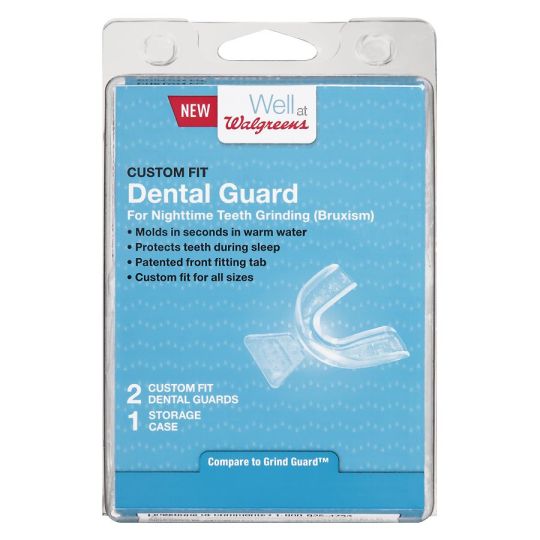
Very very important note about these!!! Do NOT use the ones that just cover your molars!!!! BAD PRODUCT, EVIL BAD, should be illegal to advertise as a TMJ product!!! If you use these, you're only going to be training your jaw muscles to clench down HARDER:
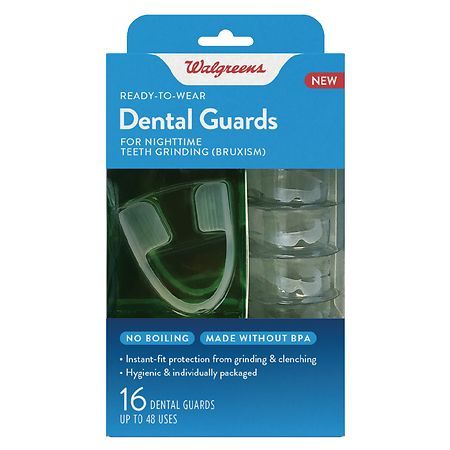

Like, bite your tongue with just your front teeth, and then bite your tongue using your back teeth. Feel how your jaw muscles are so much more activated when you bite using your back teeth? Evil
What my dentist suggested was using one of those moldable mouth guards and cutting it off at the red line, so that it's only covering your front teeth:
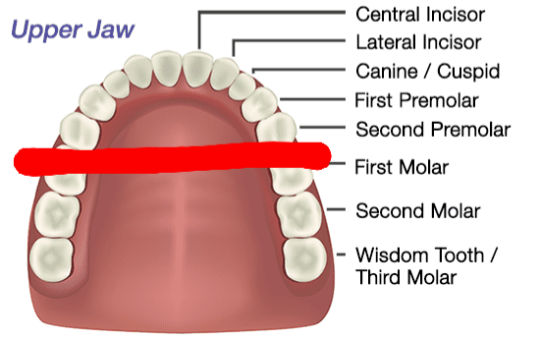
Your jaw is going to be much more relaxed, and your molars won't touch each other at all. I also find it fits a bit more comfortably this way, so, hey
Other than that, regularly massaging your jaw is about all I've got in terms of advice 😭 The mouth guard is something that will prevent your TMJ from progressing to something much more serious, and that will help a lot with managing where it is now. Massage, try to relax, etc. If it gets real bad I'd see a doctor about it, they'll give you much more in-depth advice and maybe even prescribe a muscle relaxer.
#ask#tmj#dental health#migraine#i don't usually tag stuff but this is Very important to me😭😭 please don't crack your teeth lads#i used to hATE wearing my mouth guard#but i got a lil wakeup call a couple years ago when i started experiencing frequent tinnitus from that clogged-ear feeling you described#it is ONLY going to get worse if you don't wear the mouth guard i can't stress this enough#you don't want an emergency dental bill#tmj disorder
11 notes
·
View notes
Text
Self-massage and Myofascial Pain: From Head to Fingers
Aka I'm going to talk about a muscle that is neither in the head or the fingers. It's a neck muscle called the sternocleidomastoid.
(STER-no-KLY-do-MAST-oid, or SCM for people who don't take joy in pronouncing long, confusing words.)
I am not a professional massage therapist, just a professional don't-wanna-be-in-pain guy.
This one is for...everyone. Or just about. The SCM can contribute to a vast, VAST variety of pains. Here's a sampling:
A variety of headaches (in the eye, above the eye, top of the head)
Jaw problems (including Temporomandibular Joint (TMJ) Dysfunction, stiffness, clicking)
Neck pain
Ear aches
Toothaches
And they also contribute to and are perpetuated by a foreward head posture--something that anyone who uses a phone or computer should be familiar with. Foreward head posture can further contribute to symptoms such as:
Shoulder pain
Upper back pain
Chest pain
And arm and hand pain, including symptoms similar to tendonitis, carpal tunnel syndrome, cubital tunnel syndrome, grip weakness, and much more.
See why this one applies to everyone?
Now, full disclaimer, I'm hesitant to make this the second trigger point I talk about because neck muscles are extremely sensitive. However, I'm still reaping the benefits of having finally bitten the bullet and trying this myself, and it feels important to make this one of the first I talk about.
That said, this is your first of many warnings. Go easy on these muscles. Gentle massage is better than no massage.
Here's a quick few rules:
Don't massage the SCM more than 3 times a day. In fact, if you find they are very sensitive, I recommend once a day and right before bed or a nap.
As always, never massage a pulse.
If you feel dizzy or faint, release all pressure until you regain your bearings.
Do this massage with your eyes open and sitting up. It will help you maintain awareness.
Never use massage tools on your neck.
For those with anxiety: I know this sounds nerve-wracking. As long as you go slow and listen to your body, you won't hurt yourself. If you accidentally squeeze the wrong place, it's not the end of the world! Just release pressure, move your fingers, and try again. It's only deep and extended pressure that will get you into trouble, okay?
With all that said, let's get to the good stuff.
The SCM muscles are the ones that make that sexy little V on the neck, connecting from behind the ear down to the collarbone. For all the trouble they cause, they rarely hurt themselves, which is why they get overlooked.
You've got two on each side. One in front, and one deeper in the neck. I'll teach you how to get at both.
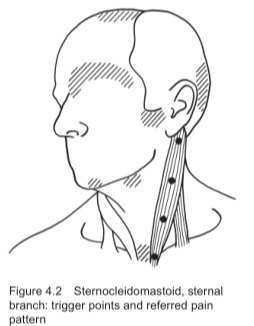
We'll start with the guy up front. Here's a snazzy little pictogram courtesy of The Trigger Point Therapy Workbook.
The shaded areas are (some of) the pain patterns caused by this muscle. The dots are meant to represent trigger points (TrPs), but the reality is that they can occur along the full length.
As a rule of thumb, TrPs further up cause more symptoms in the head. Further down contributes to everything below. This goes for both the shallow muscle and the deeper muscle.
Find somewhere to sit straight and relax your body.
Use your fingers to find your pulse on your chosen side, between the SCM and the windpipe. If your fingers aren't sensitive enough to feel your pulse, you should not do this massage yourself.
Move to the SCM side of your pulse, replace your fingers with your thumb.
Grasp the SCM lightly with your fingers and thumb, firstly just to find where you will be working. The SCM is not large, probably around the width of your finger, so don't reach too far back. If you're having trouble grasping it, look Away from the side you're working on, then tilt your head Towards it.
Now that you're familiar, make a C with your grasp fingers so that it's the tips holding the muscle. The intent is to exert more pressure with less effort. Make sure your fingernails are short for this.
Now slowly, keeping your grip light, you want to...well, the easiest way I can describe it is that your want to milk the SCM. Use short strokes, releasing the pressure at the end of each. You can massage all the way up to the ear, and all the way down to the collarbone.
Again, go easy. If you're like me, this will be painful at first. You might even feel a little brain fucked from doing this, but as long as you aren't feeling faint or dizzy, you're good to go. Don't push yourself--take a break when you've had enough.
Afterwards, lightly stretch this muscle by turning your head to the side three times.
And now for the deeper SCM.
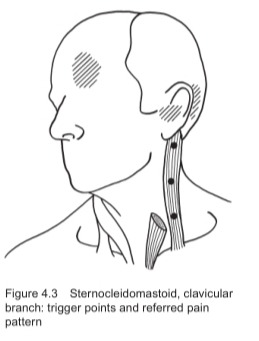
This guy isn't any harder than the shallow one. In fact, I don't even need to give you an entire list of instructions. Follow the steps above, but when you grasp the muscle, you instead want to take a larger fingerful, closer to the width of two fingers.
To help you understand what I'm getting at, put your fingertips on the back side of your neck, a small ways down and behind your ear. Gently dig in and pull forward--everything you can grasp from this point to your windpipe comprises both SCM muscles. All you need to do is grasp this entire chunk of muscle and perform the massage as described above.
With continued massage, you should gradually feel less tension in your jaw, neck, and shoulders. Your head might feel a bit clearer, you might have fewer and less intense headaches. Keep doing this massage until you can't find any tender points in the SCM.
And as a preventative--try to find ways to keep yourself from slouching or holding your head forward. A simple exercise is to pull your head back, like you're giving yourself an extra chin.
If you're interested in more posts like this, check out these links:
Low Back Pain
Massage Tips and Techniques
25 notes
·
View notes
Text
Happy Disability Pride Month!
In honor of the shift from LGBTQ Pride Month to Disability Pride Month, I’m going to bring awareness to some underrepresented and underinformed disabilities as a queer and disabled artist/writer. These are all disorders that I have come across among friends and acquaintances. Every disorder I discuss must have a clinical diagnosis in order to be treated. You should only be self-diagnosing if you plan on going to a doctor to confirm your speculations. Do not self-diagnose if you are not willing to confirm with a medical professional. This post is not to diagnose you.
Big Trigger Warning: Discussions of psychological disorders like E/Ds, depression, and personality disorders.
Dysautonomia
Any disorder relating to the autonomic (involuntary) nervous system
POTS
I have this! It is a nervous system disorder that affects heart rate and blood pressure because your nervous system does not allow your muscles to properly circulate blood, especially through the legs. Some symptoms include elevated heart rate, chest pain, low or high blood pressure, fatigue, changes in body temperature, and dizziness or fainting. POTS is more common in AFAB people than AMAB.
Amyloidosis
Amyloidosis is a disorder that occurs when a protein known as amyloid builds up in the organs. Amyloidosis is closely related to dysautonomia and chronic pain syndromes such as Ehlers-Danlos Syndrome because of the comorbid symptoms. These symptoms include edema, purpura around the eyes, skin that bruises easily, and fatigue.
Frey’s Syndrome
A neurological disorder closely related to dysautonomia that causes excessive sweating while eating. There are very few solutions to this disorder and even fewer of them are known to work.
Mitochondrial Syndrome
Mitochondrial diseases occur when there are genetic mutations and deformations to the mitochondria in cells that directly influence how the organelle produces energy. People with mitochondrial diseases can have poor growth, muscle weakness, seizures, visual and / or hearing problems, learning disabilities, and may develop kidney, liver, or heart disease.
Autonomic Dysreflexia
Autonomic dysreflexia is a disorder that causes abnormal overreactions of the autonomic nervous system. Symptoms include elevated heart rate, excessive sweating, and high blood pressure.
Chronic Pain
Any disorder relating to long-lasting pain surrounding any part of the body.
Patellofemoral Pain Syndrome
I have this one too! Patellofemoral pain syndrome is a chronic pain syndrome in which muscles in the lower extremities are too weak to support patellar (kneecap) movement. Thus, the patella (kneecap) will not track right. this causes lots of issues with walking.
Scoliosis
I also have this one! Scoliosis is defined as a physical disorder in which the spine is not a straight vertical line. There is either an “S” or “J” curve in the spine, compressing it and causing sharp or aching back pain.
Temporomandibular Joint Dysfunction
TMJ causes pain and tenderness in jaw joints and surrounding muscles and ligaments. Symptoms of TMJ include jaw stiffness, limited movement and locking of the jaw, ringing in ears, and dizziness.
Myofascial Pain Syndrome
This is a chronic muscular pain disorder. Typically, this pain is confined to one specific area, such as the neck or shoulders.
Fibromyalgia
A chronic disorder that causes pain and tenderness throughout the body, as well as fatigue. People with fibromyalgia can also have depression, anxiety, and trouble with memory and concentration.
Ehlers-Danlos Syndrome
EDS is a group of disorders that affect connective tissues that support the skin, bones, blood vessels, organs, and other tissues. Symptoms of EDS include stretchy, translucent skin, loose joints, and chronic pain.
Arthritis
Arthritis is defined as inflammation in one or more joints causing stiffness and pain. There are many different kinds of arthritis, each with different causes. These causes can include wear over time, infections, and underlying diseases.
Neurological Disorders
Any disorder relating to the brain and how it functions.
Seizure Disorders
Epilepsy
Epilepsy is a disorder of the brain characterized by repeated seizures. People with epilepsy can experience multiple kinds of seizures and can experience symptoms such as confusion, staring spells, stiff muscles, and loss of consciousness.
Cerebrovascular Diseases
Functional Neurological Disorder
Functional Neurological Disorder is essentially a stroke mimic. It can replicate the symptoms of a stroke, such as limb weakness, numbness, and speech disturbance.
Migraines
Lots of people have migraines and I am no exception. Migraines are caused by excessive blood flow to the brain. Migraines affect more than 10% of people worldwide and are 3 times more likely to affect AFAB people than AMAB people.
Psychological Disorders
Any disorders affecting mood, thinking, and behavior. I will not be discussing my mental disorders on the internet. Most people are familiar with what these are and what they look like, so I will instead be providing statistics for each one.
Anxiety Disorders
Generalized Anxiety Disorder (GAD) affects 6.8 million adults. Only 43.2% of those adults are receiving treatment. AFAB are twice as likely to be affected (Anxiety Disorders Association of America).
Panic disorder (PD) affects 6 million adults. AFAB are twice as likely to be affected (Anxiety Disorders Association of America) .
Obsessive-Compulsive Disorder (OCD) affects 2.5 million adults. AFAB are 3x more likely to be affected (Anxiety Disorders Association of America) .
Post-Traumatic Stress Disorder (PTSD) affects 7.7 million adults. AFAB are 5x more likely to be affected (Anxiety Disorders Association of America) .
Depression
Approximately 280 million people in the world have depression. AFAB are twice as likely to develop depression (World Health Organization).
Bipolar Disorder
4.4% of US adults experience bipolar disorder in their lives (National Institute of Health).
Personality Disorders
It is estimated that 9% of US adults have at least one personality disorder (American Psychiatric Association).
Eating Disorders (TW)
Eating Disorders affect 9% of the population worldwide (National Association of Anorexia Nervosa and Associated Disorders).
BIPOC are significantly less likely than white people to be asked by a doctor about eating disorder symptoms (National Association of Anorexia Nervosa and Associated Disorders).
Black teenagers are 50% more likely than white teenagers to exhibit bulimic behaviors (National Association of Anorexia Nervosa and Associated Disorders).
Rates of body dissatisfaction were higher among transgender and nonbinary youth (90%) compared to cisgender youth (80%) (National Association of Anorexia Nervosa and Associated Disorders).
#disability pride month#disability awareness#disability#dysautonomia#pots#chronic pain#neurological disorder#psychological disorders
15 notes
·
View notes
Text
Solutions - KNJ

Pairing: Namjoon x Reader
Warning: smut, oral sex, reader has TMJ
A/N: this is oddly specific but the reason I wanted to write it is because this is a situation that a ton of my friends and I have been stuck in and don’t really know what to do so we were all awkwardly struggling. But I think making compromises and adaptions is hot af
• your relationship is new and exciting and you’re starting to get intimate together
•it’s an exciting time but you tend to keep delaying going further with him
•after postponing a few times, Joon decides to confront you
•he’s super sweet and a little concerned
•“if you’re not ready that’s okay baby we can take our time”
• “It’s not that,” you sigh before sitting up on the bed and looking into those beautiful eyes of his
•“I feel like I’m going to let you down…”
•“what? that’s not possible baby. why do you think that?”
•that’s when you explain that you have Temporomandibular joint dysfunction, known as TMJ, which can cause stiffness and pain around your jaw, ear and temple
• it was embarrassing but you shared how you feared not being able to perform oral on him because of the pain or even the possibility of your jaw stiffening up
• expecting him to be disappointed, since many men have made it very clear that getting head was important, you were slightly taken back when he took your hands and smiled
• “baby you don’t need to worry. our relationship and intimacy is more than just you sucking my dick,” he chuckled
• “but I still feel bad… like I can’t give something to you”
• “that doesn’t matter. and I’m sure this is so much more common than you think
•he pulls his phone off the nightstand and literally searches “blow jobs with TMJ” before pointing out many articles and forums of people sharing the same situation
•“we can find other ways to have fun with that pretty mouth of yours” he smirked
•and you did. before even getting to full on sex, you took your time experimenting
•you found that kitten licking up and down his length was something he really enjoyed
•when your jaw wasn’t painful you’d be able to take part of him in your mouth and let your tongue do most of the work, while massaging the base and his balls in rhythm
•he kept still while you performed orally on him to make sure he didn’t aggravate things and would check in with you, insisting you let him know the moment things became an issue
•he was very much a fan of you licking under his shaft and tracing his veins with your tongue rather than taking him into your mouth properly
•after much exploration, you two found what really got him going without causing you damage and your bond and intimacy grew closer after working together for solutions, your communication being the best it could ever be
do not copy or re upload my work©
#bts smut#bts pwp#bts after dark#bts drabbles#bts 18+#bts imagines#Namjoon smut#rm smut#knj#knj smut#RM drabble#namjoon drabble
74 notes
·
View notes